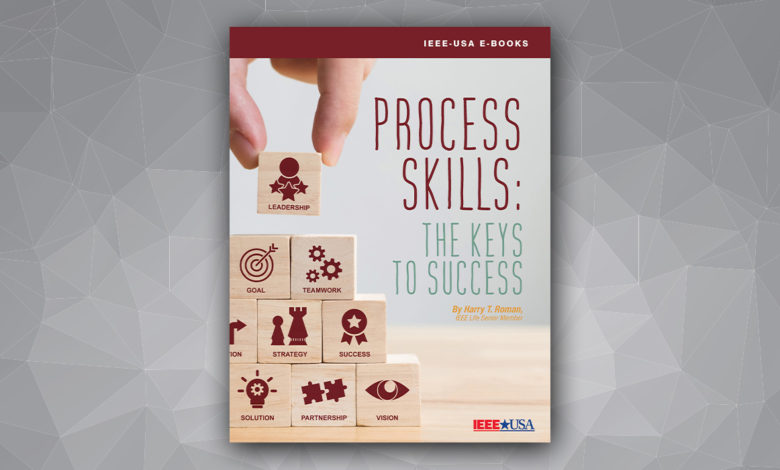
“What motivates a company to hire and keep you isn’t what you know, but rather, what you can do with what you know – and how fast you can do it.”
So says veteran engineering educator Harry T. Roman, who believes that in addition to technical skills, engineers must also develop and make good use of process skills. He describes these competencies as “the know-how to integrate knowledge and make something happen.”
In his useful new e-book, Process Skills: The Keys to Success, he emphasizes that having process skills can be a powerful selling point for why a prospective employer should hire you. Once you’ve been hired, putting these skills to work can make a big difference in helping one’s company stay strategically competitive in the global marketplace. IEEE-USA is introducing the volume this month at https://ieeeusa.org/shop/, for $2.99 for members and $4.99 for non-members.
“How you do what you do is unique,” states Roman, “and that is where your value to the company accelerates upward.”
In the e-book, Roman discusses six key aspects of important process skills, including: the ability to write and speak effectively; understanding and handling management- leadership duality; viewing employees as corporate investments; and the entrepreneurial instinct to make the all-important connection between invention and commercialization.
Discussing writing and speaking, which he calls “the two great enabling skills,” the author posits that five years after graduating, an engineer’s most important abilities are not the technical knowledge learned in the classroom.
“In your career, you will not appear regularly in front of senior management,” he writes. “People in high authority positions will judge you by how well you write; and perhaps by what they hear from you in a presentation or meeting. Your written reports can make their way to senior management desks, and these high-level executives will most certainly scrutinize your writing style.”
He adds that producing polished written reports, and speaking well before groups, are skills that last long after an engineer’s early professional years. These learned abilities can also lead to interesting career and personal opportunities. Meanwhile, excellent writing and speaking skills allow the professional to work with many other people. This can create promising situations for selling new concepts within one’s company.
Another important process skill that Roman discusses is handling the management-leadership duality that occurs within project teams. “A seasoned project manager spends as much time being an inspirational leader as being a no-nonsense manager,” Roman says. “The balance can be difficult to achieve; as a general rule, manage your resources but always lead your team.”
He encourages project managers to teach the innovation process to others. “Developing your staff doesn’t end when you get a special project to manage,” he writes. “Special projects are opportunities for everyone to grow.”
Still another process skill – managing your employees as corporate investments – isn’t obvious, but Roman believes it is critical to career success.
“You probably have a strategy for addressing your portfolio investments,” he writes, “so shouldn’t you have a process for tending to valuable employees?”
For example, he suggests considering what special skills your employees or team members possess that can be a significant asset to the company going forward. It’s also important to consider what skills key employees need for their current assignments, as well as what corporate problems or strategic questions team members should be involved in addressing.
What about succession plans? Do your key team members fit into key employee succession plans? If not, what kinds of development do they need to be able to step into another key employee’s shoes, if necessary?
Roman believes that developing an entrepreneurial instinct is another key component of process skills. “It is key to making the connection between invention and commercialization,” he says.
“For small- to medium-sized companies, a lack of entrepreneurial instinct means bankruptcy, loss of jobs, and sunk investments – a terrible waste of market potential,” he continues. “Did you know that only two out of 50 new products become a real commercial success; or that only about two percent of all the patents issued ever become successful in the market?”
The author encourages finding the vulnerable points in your implementation plans and processes, and assures readers that the commercialization process “only gets better and smoother with your practice and commitment, and by how you lead your people.”
To prove his case for developing process skills, Roman discusses three examples of how he used process during his 36-year with PSE&G, New Jersey’s largest utility company. In one, while working as a research project manager involved with integrating robotic devices, Roman and his team established a testing lab for prototypes and existing systems. The lab not only served as design space for other departments interested in applying robotics in their operations, but also showcased new robotic devices for personnel to see, as well as receive training. At the same time, he leveraged his hardware budget by 40 to 50 percent, because developers were often willing to collaborate on, or co-develop robotic systems.
“Turn your personal purpose into a physical manifestation of what you can and want to do for your employer,” he says. “Merge you career desires with those of your company– and you will feel like you never worked a day on the job!”
Helen Horwitz is an award-winning freelance writer who lives in Albuquerque, N.M. She was with IEEE from 1991 through 2011, the first nine as Staff Director, IEEE Corporate Communications.






